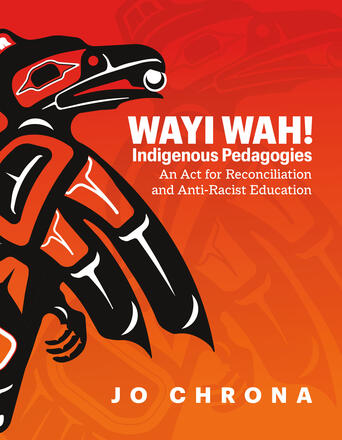
Wayi Wah! Indigenous Pedagogies
An Act for Reconciliation and Anti-Racist Education
Extend your learning to explore how racism and bias are embedded in education systems, as well as our own perspectives—and how to create equitable education for all learners.
La description
★ Starred selection for CCBC's Best Books Ideal for Teachers 2023!
Now a National Best Seller!
How can Indigenous knowledge systems inform our teaching practices and enhance education? How do we create an education system that embodies an anti-racist approach and equity for all learners?
This powerful and engaging resource is for non-Indigenous educators who want to learn more, are new to these conversations, or want to deepen their learning.
Some educators may come to this work with some trepidation. You may feel that you are not equipped to engage in Indigenous education, reconciliation, or anti-racism work. You may be anxious about perpetuating misconceptions or stereotypes, making mistakes, or giving offence. In these chapters, I invite you to take a walk and have a conversation with a good mind and a good heart.
With over two decades in Indigenous education, author Jo Chrona encourages readers to acknowledge and challenge assumptions, reflect on their own experiences, and envision a more equitable education system for all. Each chapter includes
- reflection questions to help process the ideas in each chapter
- suggestions for taking action in both personal and professional spheres of influence
- recommended resources to read, watch, or listen to for further learning
- personal reflections and anecdotes from the author on her own learning journey
- voices of non-Indigenous educators who share their learning and model how to move into, and sit, in places of unknowing and discomfort, so we can examine our own biases and engage in this work in a good way
Grounded in the First Peoples Principles of Learning, this comprehensive guide builds on Chrona’s own experiences in British Columbia’s education system to explore how to shape anti-racist and equitable education systems for all.
Perfect for reading on your own or with your professional learning community!
Récompenses
- Short-listed, Manuela Dias Book Design and Illustration Awards, Book Design 2023
Reviews
If you are feeling uneducated yourself and unsure about how to help your students grapple with the concepts of racism and reconciliation, let this book be your guide to greater understanding and confidence. The chapter headings are an excellent reflection of the scope of the content and will give you an idea of how useful this book is.
- Diana Mumford
Among Quill & Quire's National Day for Truth and Reconciliation: A reading list of books published in 2022 that provide a pathway to greater understanding, deeper reflection, and a way forward.
- Quill & Quire
Learning is a lifelong endeavour. And for educators -- it can also mean making it an equitable environment for all learners. As we are set to mark Truth and Reconciliation Day on September 30th -- there's a new book that looks at that from the perspective of Indigenous Knowledge Systems. The book is called Wayi Wah! Indigenous Pedagogies: An Act for Reconciliation and Anti-Racist Education.
- On The Coast, CBC Listen
I recently received a review copy of Wayi Wah! Indigenous Pedagogies: An Act for Reconciliation and Anti-Racist Education, by Jo Chrona. If the articles you read [in Education Canada Magazine] excite, inspire, or call you to action and you want to learn more, this book is a great next step (specifically for an Indigenous focus). With a compassionate and plain-spoken voice, the author walks us through chapters on the role of educators in reconciliation and decolonization, Indigenous education and Indigenous-informed pedagogy, understanding systemic racism, and more. Every chapter includes questions for reflections, ways to take action, and resources for further learning and classroom use.
- Holly Bennett
Among CCBC's Best Books for Kids & Teens 2023, Ideal for Teachers, starred selection of exceptional caliber
- CCBC
The journey of an educator, that Chrona has so ably shown, is never-ending. She has written, in a clear, direct voice, an important book which is essential reading for everyone working with Indigenous peoples in the education system.
- The British Columbia Review